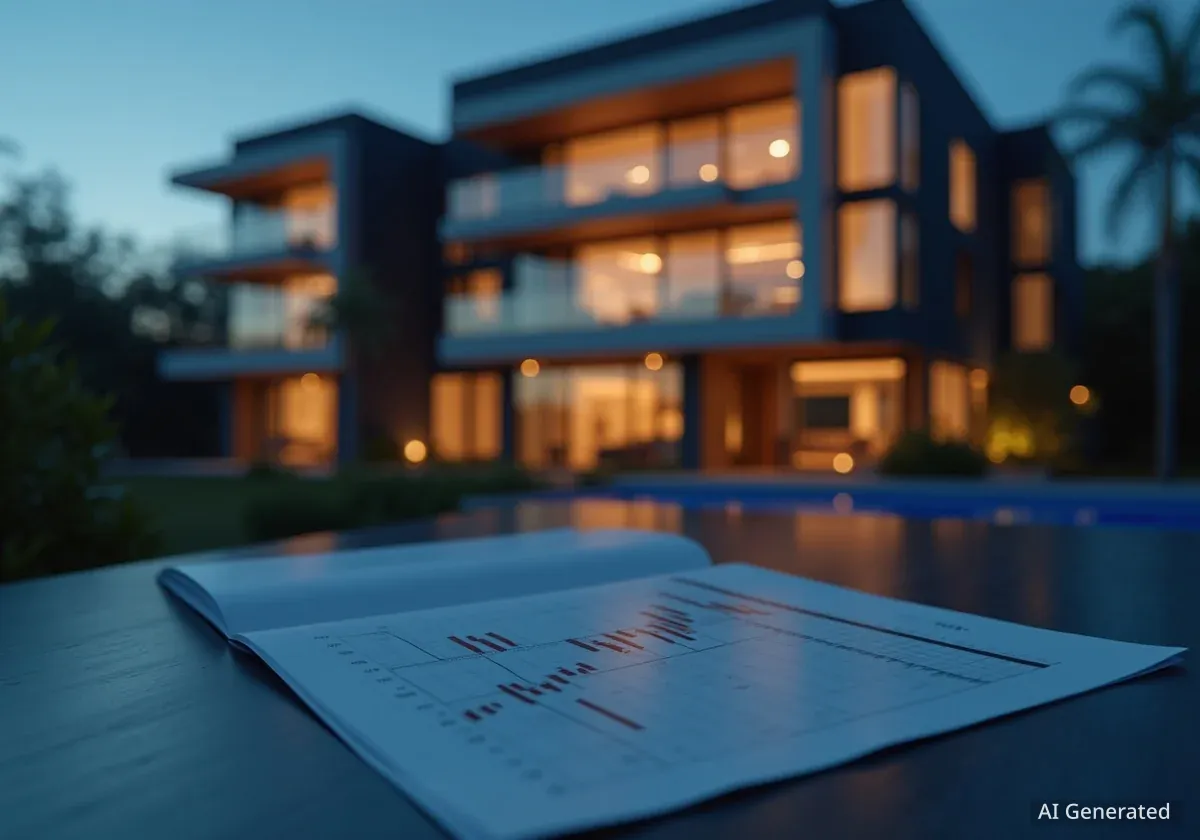Shifts in borrowing costs are influencing the decisions of high-end homebuyers, according to real estate market experts. While often perceived as immune to interest rate changes, luxury buyers are showing increased market activity as rates ease, signaling a release of pent-up demand and a change in market psychology.
Industry leaders from Sotheby’s International Realty, Compass, and Daniel Gale report that even wealthy clients, who may not require financing, use rate fluctuations as a key indicator for timing their multi-million dollar purchases. This trend affects everything from buyer confidence to budget allocation in competitive markets like the Hamptons.
Key Takeaways
- Even though many luxury buyers purchase with cash, interest rates significantly influence their confidence and the timing of their transactions.
- Lower borrowing costs can create a sense of urgency, prompting buyers who were waiting on the sidelines to enter the market.
- Experts note that financially savvy high-end buyers often use financing strategically for liquidity, investment, or tax purposes, making rate changes relevant.
- The current market is seeing increased activity and quicker deals in the high-end sector as a direct result of easing interest rates and tight inventory.
The Psychology of Buyer Confidence
While most luxury property acquisitions do not depend on traditional financing, interest rates still play a crucial role in shaping buyer sentiment. According to Maida Srdanovic of Compass, the cost of borrowing acts as a barometer for market health and timing.
“Most luxury buyers don’t rely heavily on financing, but interest rates still influence how confident they feel about timing a purchase,” Srdanovic explained. She noted that many well-qualified buyers have been observing the market over the past year, waiting for a more favorable economic climate.
With borrowing costs beginning to moderate, that hesitation is starting to fade. “Now that borrowing costs are starting to ease, that hesitation is giving way to more activity,” she added. This shift is particularly noticeable in the ultra-luxury segment, where the decision to buy is often less about affordability and more about strategic timing.
Market Dynamics and Inventory
A key factor amplifying the effect of interest rates is the limited supply of high-end properties. Srdanovic points out that inventory remains tight, especially for homes in the $10 million and above range. This scarcity creates a competitive environment where decisive action is rewarded.
The combination of pent-up demand and low inventory is translating into more property viewings and faster transactions. For these buyers, aligning their purchase with favorable market signals, like lower rates, is a critical part of their investment strategy.
Strategic Financing in High-End Transactions
The notion that cash buyers are entirely disconnected from interest rates is a common misconception. Michaela Keszler of Sotheby’s International Realty emphasizes that even the wealthiest clients are financially astute and often leverage financing as a strategic tool.
“While many high-end buyers aren’t as rate-sensitive as first-time or more entry-level purchasers, they still want to be financially savvy. Many of them leverage financing strategically, whether it’s for liquidity, investment purposes, or tax planning.”
According to Keszler, a small reduction in the cost of capital can be a powerful motivator. When rates fall, it presents an opportunity for buyers to secure favorable terms, freeing up capital for other investments. This financial prudence is a hallmark of the luxury market.
The Ripple Effect on Market Tiers
Lower rates can also encourage buyers to expand their budgets, creating a ripple effect across different price points. Keszler noted that more attractive financing might inspire a buyer initially looking in the $5 million range to consider properties priced at $6 million or more.
“It increases competition across all tiers of the market,” she stated. This heightened competition generates a sense of urgency. When buyers see more offers being accepted and properties moving into contract, those who were passive observers feel compelled to act before opportunities disappear.
Pent-Up Demand Released
Keszler describes lower interest rates as the “spark that activates the high-end segment.” It’s not necessarily about the need for a loan but the recognition of a strategic moment. This triggers the release of significant pent-up demand from buyers who have been patiently waiting for the right conditions.
Broader Economic Influences
While interest rates are a significant factor, they are not the only force shaping the luxury real estate market. Deborah Pirro of Daniel Gale points out that other global and financial events have had a substantial impact on recent transaction volumes.
Pirro believes that high-end purchases are indeed rate-sensitive, influencing how much of a large budget a buyer is willing to deploy. “A buyer with a $100 million budget may end up purchasing something for $25 or $50 million, due to the cost of that money,” she explained.
In her view, a more substantial drop in interest rates would be needed to unlock the full extent of pent-up demand. When that occurs, she predicts prices will rise further due to the classic principles of supply and demand.
She also highlighted the role of the financial markets in 2025. “This year’s deals have been affected by global events, the initial downturn in the financial markets at the beginning of 2025, and then, of course, the rebound that we have seen in the second and third quarters,” Pirro said. This underscores that luxury real estate is deeply interconnected with broader economic confidence and performance.





